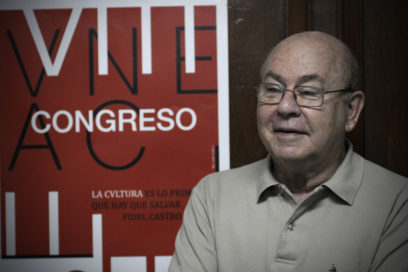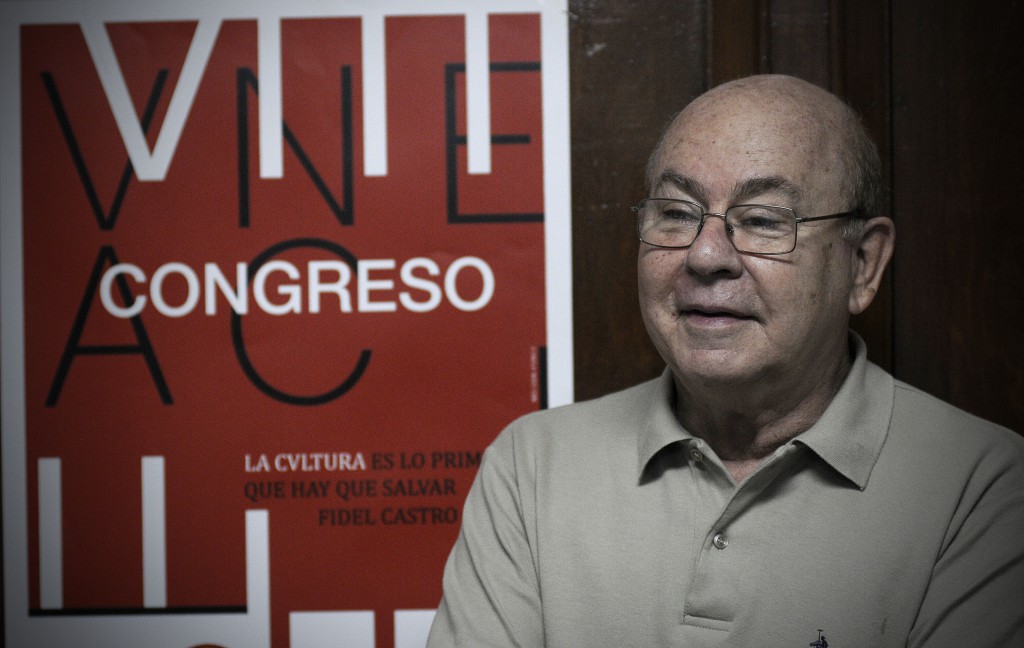Culture is the first thing we have to salve…
Fidel Castro
… because it is the basis of the Cuban society.
Miguel Barnet
With the recurrent deference to the union movement, the president of the Organizing Commission of the 8th Congress of the National Association of Cuban Writers and Artists (UNEAC), Miguel Barnet Lanza (Havana, January 28, 1940), Cuban writer alive that had published in Cuba and abroad and the most prominent personality of the Cuban culture in the current in millenniums, accepted this interview- the first that coincide in a media with this purpose- on the next convention of the organization to be held in Havana, Cuba from April 11 to 13.
“I feel really pleased this interview is published in Trabajadores newspaper, because sometimes we talk about people and workers as if intellectuals and artists were not people and workers too. We are intellectual workers from Culture, like the teachers, scientists and all people working with the thought,” said the National Award of Literature 1994.
Sustainable in Cuba is not only in the economic development, but also in culture, Education, which are the essence
Poet, narrator, essayist and ethnologist, Barnet is member founder of UNEAC, an organization that, he said, groups the indissoluble vanguard linked to out authentic roots and whose purpose is “giving cohesion to the cultural policy of the Revolution, always attentive to the historical moment, committed to strengthen cultural institutions that had done of this people, if not more cultivated, it is one of the most instructive of this continent, with readers, despite the push of the technological means, they believe in the book and assume it as personal relic,” Barnet said.
“This is a very important Congress, before all, because it will be held in the middle of a process of changes in the economy and the Cuban society, what favors new transformations in procedures that are of the interest of all its members. Sustainability of a nation is not only in the development of the economy, but also in Culture and Education which are the essence,” he stressed.
He noted that in this congress there will be more participation of young members compared to previous congresses and highlighted the high percent of women.
Barnet said the members of UNEAC are devoted to “opinions with the goal to help satisfy the cultural policy designed by Fidel Castro Ruz in his historical Address to the intellectuals (June 1961), from where this organization emerged leaded for more than 20 years by Nicolas Guillen. So, writers and artists members of this organization should fulfill not only an artistic function, but also eminently ethical.”
Barnet informed the job of the five commissions founded is daily working for the 8th Congress of UNEAC on the base, because it is there where the main topics of the Cuban society are debated. The commissions are Culture, education and society; Art, marketing and cultural industries; City, architecture and patrimony; Culture and media, and Statutes and Regulations.
Lab of ideas
“We have had good collaboration by the delegates that are 310, as well as several organisms linked to UNEAC, among them the Ministers of Culture, Education and Communications and Informatics, Finance and Prices and Foreign Relations, besides the Cuban Institute of Radio and Television. In the meetings before the Congress with ministers and deputy ministers of those branches, there have been debated about the topics of each of the commissions. They were excellent labs of ideas, the debates not only of fine arts and literature, but also on the future of the country.
“There were also held fruitful meetings with the presidents of the institutions and the national councils of the Minister of Culture (MINCULT). We should highlight the attendance of the minister of MINCULT, Julian Gonzalez in all the meeting in Havana and other provinces who helped the interrelation of UNEAC with that minister.”
As the highest exponent of literature in Cuba, Miguel Barnet ended his interview with a phrase attached to his profession as writer: “We are workers of culture; and the book is still a talisman for us.”



